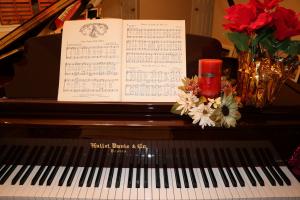
Creators of the Carols
Have you ever wondered about the stories behind your favorite Christmas carols? The people who composed and wrote the lyrics for these songs were regular people, and some of them experienced major setbacks in life, yet they gave us the gift of Christmas music. I hope you will be inspired by the stories highlighted in this essay!
William Chatterton Dix – What Child is This?
William Chatterton Dix developed a life-threatening illness and was bedridden for a long time. He was depressed and experienced a spiritual crisis and ended up becoming a devout man of faith. He recovered and was inspired to write poetry and hymns with Christian themes, one of which became “What Child is This?”, a song which eventually became more popular in the US than in the UK where it originated.
James Montgomery and Henry Smart – Angels from the Realms of Glory
James Montgomery was sent to live at the Moravian seminary when he was only six or seven, when his parents went to Barbados as missionaries. He never saw them again, as they died there. He was imprisoned for political reasons and continued to champion the cause of the oppressed, even when he was in prison. He was a gifted writer and produced approximately 400 hymns during his lifetime. One of his poems, “Nativity”, eventually became the song “Angels from the Realms of Glory.”
The music for this song was composed by Henry Smart, a mostly self-taught musician who, despite being almost blind for the last 15 years of his life, continued to play and write music.
Isaac Watts – Joy to the World
Isaac Watts was born while his father was in prison for going against the teachings of the Church of England. Although his hymns were popular, some people opposed their use in churches and some even referred to him as an agent of the devil. Over the course of his lifetime, Isaac Watts composed over six hundred hymns and poems, including “Joy to the World.”
Adolphe Charles Adam, Placide Cappeau and John Sullivan Dwight – O Holy Night
Adolphe Adam was a prolific composer and he composed the music for “O Holy Night.” He opened his own opera house in 1847, but unfortunately lost his investments and capital when political unrest led to the closure of the opera house only four months after it opened. He was eventually able to pay off his debt while supporting himself as a music journalist, even though he didn’t live to witness the success of the carol he helped create.
Placide Cappeau
Placide Cappeau wrote the poem that became “O Holy Night.” When he was only eight, a friend accidentally shot him and he lost his hand. The friend’s father ended up paying for part of Cappeau’s education and he attended the Royal College of Avignon, where he won an award for drawing.
John Sullivan Dwight
John Dwight attended the Harvard Divinity School and became a Unitarian minister. According to reports, he experienced panic attacks when he had to face the congregation, and so was unable to continue in ministry. He eventually became a music critic and a musical editor for several magazines. It was while searching for songs for a publication that he found a French poem, which he translated to “O Holy Night.”
Almost two centuries after it was first written, “O Holy Night” continues to inspire people and has been recorded by notable musicians, including Celine Dion, Nat King Cole and Josh Groban.
Jester Hairston – Mary’s Boy Child
The grandson of slaves, Jester Hairston was raised by his grandmother after he lost his father to an accident as a young boy. He was determined to preserve history through music and composed or arranged over 300 choral spirituals. Known for breaking racial barriers, Hairston was the first African American to be invited to conduct the Mormon Tabernacle Choir and he was active in organizing Hairston family reunions for both Black and White descendants.
Edmund Sears – It Came Upon the Midnight Clear
Edmund Sears was forced into early retirement due to poor health and focused on writing for the rest of his life. He was disturbed by slavery and poverty and believed that Christians should help the poor and wanted to inspire his congregation with an inspiring Christmas message when he wrote “It Came Upon the Midnight Clear,” which has been a source of inspiration to many, particularly during times of war.
Joseph Mohr – Silent Night
Joseph Mohr became a priest by special dispensation, as he had been born to an unwed mother. He grew up to be extremely generous, donating most of his income to charity. Mohr died in 1848, oblivious of the global impact his song would ultimately have. Once considered unsuitable for inclusion in hymn books, “Silent Night” has now been translated into at least 300 languages.
Jose Feliciano – Feliz Navidad
Jose Feliciano was born blind due to congenital glaucoma. Despite this, he started playing the accordion at age seven, and the ukulele shortly thereafter. As a teenager, he listened to records and played them on the guitar from memory, since he couldn’t read music.
He composed “Feliz Navidad,” a bilingual Christmas song, within minutes. Little did he know that it would go on to become an international sensation.
Reflection:
The setbacks experienced by the men in the stories above didn’t prevent them from creating the inspiring songs that are now a regular part of Christmas celebrations. Are you allowing setbacks to hold you back from sharing your talents with the world?
To learn more about the stories behind Christmas carols, you can check out my book, “I Played My Best for Him! The Inspiring Stories Behind the Little Drummer Boy and Other Christmas Favorites.”
You can listen to the songs on Spotify, or your favorite listening platform.
Merry Christmas! Happy Holidays! Best wishes for a prosperous New Year!













